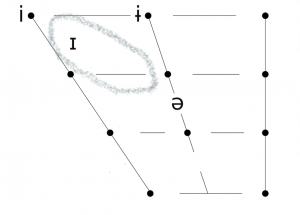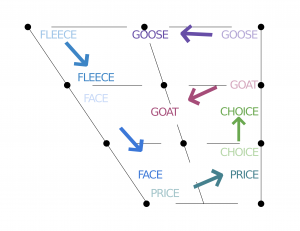1 The KIT Lexical Set

The kit lexical set is a part of the group of Checked vowels that, in most varieties of English, is capable of being in either stressed or unstressed syllables. Historically, kit evolved from the short /i/ vowel, while fleece evolved from the long /i/. In most varieties of English today, kit is more central than fleece, on a diagonal line in the vowel space towards schwa, /ə/.
- ☑️ Checked: requires a following consonant, and cannot exist on its own
- in both stressed and unstressed syllables
Spellings
iC, eC, oC, uiC, yC
The vast majority of words within the kit set are spelled ‹i› before a consonant (C), or ‹iC›, as in this, will, think. Less common spellings in stressed syllables include: pretty, women, busy, built, myth.
The kit vowel can be heard in unstressed vowels in most varieties of English, with spellings such as
iC, aC, aiC, eC, eiC, oiC, yC
plastic, garbage*, bargain*, actress*, foreign*, margin*, women*, connoisseur*, amethyst.*
*: frequently pronounced with schwa, rather than /ɪ/, and thus are part of the comma lexical set.
Pronunciations
The kit lexical set is pronounced with some variation of the /ɪ/ vowel in the vast majority of mainstream accents of English. However, there is a limited range of alternate pronunciations, ranging from a very high/close pronunciation approaching [ɪ̝ ~ i], to a mid-centralized vowel closer to schwa [ɪ̽ ~ ə].
kit can have an offglide [ɪə̯ ~ iə̯], as is heard in some Southern US and African American varieties.

For Englishes with a very high (close) dress vowel, kit can be moved up into the range of [i], merging with the fleece lexical set, through a process known as a chain shift. In Australian English, kit has been shown to be even more close than fleece. Alternately, kit can shift to the centre of the mouth, with [ə] the most common example, as we see in New Zealand English.
Many second-language (L2) speakers of English lack an [ɪ] vowel in their first-language (L1) vowel system; in almost all of these cases, the tendency is to substitute their [i], which is often higher/closer than an English fleece vowel. L2 speakers may use spelling pronunciations for words with spellings other than ‹i›, especially in languages where spelling and pronunciation are more directly linked than in English.
Personal Pronunciation
Where does your pronunciation lie? Experiment on your own or with a classmate, friend, coach or teacher to identify how your kit vowel compares with others. Try extending the sound of your kit vowel, and then attempt to subtly shift it around in the vowel space—up, forwards, down, and back—in tiny increments. You should feel the top surface of your tongue moving towards/away from your alveolar (gum) ridge behind your upper front teeth. What’s the smallest noticeable change that you can make?
If your kit vowel is
- high, use the raised diacritic [ ɪ̝ ], a small T pointing up
- open, use the lowered diacritic [ ɪ̞ ], a small T pointing down
- pushed forward, use the advanced diacritic [ ɪ̟ ], a tiny plus sign
- pulled back, use the retracted diacritic [ ɪ̠ ], a tiny minus sign –
- moved toward the middle of the mouth, towards schwa [ə], use the mid-centralized diacritic [ ɪ̽ ], a tiny x-marks-the-spot above the symbol,
- if you add lip-rounding, use the more rounded diacritic [ ɪ̹ ], a tiny ɔ, which represents the lips rounding forward (to the left).
Alternate Pronunciations
Experiment with the Word Lists, Phrases and Sentences with the following vowels:
As you move the vowels in the directions recommended, see whether that modified oral posture might inspire you to move the articulation of consonants and other vowels in the word in similar ways. Does it remind you of another accent?
Word Lists for kit, sorted by the consonant that follows
KEY: ◾︎ kit in stressed syllable ◽︎ kit in unstressed syllable
PLOSIVES
-p
-b
-t
-d
-k
-ɡ
AFFRICATES
Australian English speakers who merge fleece–kit may find it easier to identify kit words when followed by these sounds[1].
-tʃ
-dʒ
NASALS
-m
-n
-ŋ
‹-ing› ENDINGS
The unstressed -ing endings of present participles and gerunds are frequently a helpful target for accent study. Frequently pronounced [ɪŋ], perhaps the most well-known variation is so-called “g-dropping.” The /ŋ/ consonant changes to /n/, [ɪn], which corresponds to the spelling without a ‹g› “-in’ ”. As there is no actual /ɡ/sound to drop, it really is a shift of the velar consonant forward to the alveolar articulation. In other varieties, the nonexistent “g” (which was part of Early Modern English) may be articulated, [ɪŋɡ, ɪŋk]. At the ends of phrases, some varieties merely use a ejective /k/, made by holding your breath, and pressurizing the /k/ by pulling the larynx up [ɪŋk’].
Regardless of which consonant gets used, the vowel can also shift to a more tense version, [iŋ ~ i̽n], or to a more lax version, [eŋ ~ ɛŋ ~ əŋ] or [en ~ ɛn ~ ən]. And the ending can be further reduced throuɡh the use of a syllabic consonant, betting [ˈbɛtn̩].
Note that words with a stressed syllable ending in ‹-ing›, e.g. ring, sting, bring, sing, do not behave similarly, though the articulated final velar plosive/ejectives are still possible. Compared to progressives, participles, and gerunds, nouns like ceiling or morning are the least likely to have “g-dropping”.
‹-thing› ENDINGS
In some varieties, ‹-thing› endings behave similarly to ‹-ing›, while in other varieties they do not. Note that the 2 syllables make the ending in something, nothing unstressed, so it is more readily reduced; the 3 syllables of everything, anything mean that the ending frequently has a secondary stress, and so reduction via “g-dropping” is less likely to occur.
FRICATIVES
-θ
-ð
-f
-v
-s
-z
-ʃ
-ʒ
Vowels followed by /r/ and /l/ often are affected by the following consonant. When followed by ‹r› this can make the kitvowel into a centring diphthong [ɪə̯] or [ɪɚ̯]. When followed by ‹l›, the vowel is often pulled back, especially if /l/ is articulated with the dark-l [ɫ], which may move the vowel more towards schwa [ə].
 In order to practice these vowels without the following consonant affecting them, experiment with the “Consonant Chop” technique. Speak the word without the following consonant and all that comes after it, chopping the word off right after the kit vowel. For example, for spirit, you would start by saying “spi-“ then, as two units, say “spi- -rit”. If you’re working on using the [ɪ] vowel, that would be [spɪ—ɹɪt]. Then try putting the two syllables closer and closer together, [spɪ – ɹɪt, spɪ-ɹɪt, ˈspɪ.ɹɪt, ˈspɪɹɪt]. You can also try a different vowel, say [i], and change the /r/ to a tap [ɾ] [spi– ɾit, spi-ɾit, ˈspi.ɾit, ˈspiɾit]. If you have success with that more extreme oral gesture, then you can attempt the [ɪ.ɹ] version after.
In order to practice these vowels without the following consonant affecting them, experiment with the “Consonant Chop” technique. Speak the word without the following consonant and all that comes after it, chopping the word off right after the kit vowel. For example, for spirit, you would start by saying “spi-“ then, as two units, say “spi- -rit”. If you’re working on using the [ɪ] vowel, that would be [spɪ—ɹɪt]. Then try putting the two syllables closer and closer together, [spɪ – ɹɪt, spɪ-ɹɪt, ˈspɪ.ɹɪt, ˈspɪɹɪt]. You can also try a different vowel, say [i], and change the /r/ to a tap [ɾ] [spi– ɾit, spi-ɾit, ˈspi.ɾit, ˈspiɾit]. If you have success with that more extreme oral gesture, then you can attempt the [ɪ.ɹ] version after.
-l/ɫ
Prefixes and Suffixes
For accents that preserve the Weak kit vowel, many prefixes and suffixes use a reduced, unstressed version of this vowel. For those with the Weak Vowel Merger (see below), these would all take schwa [ə].
Short Phrases
- This is it.
- I will finish it.
- Which is it?
- Silverfish infestation
- In it to win it.
- The pretty bridge.
- Civil discourse
- Driven to distraction
- A delicious kiss
- A lily-livered idiot
- Drinking it all in.
- A million little things.
- Whitney is visiting Israel.
- A Magnificent Italian Villa near Venice.
- Original gin fizz recipe.

Sentences
Level 1
Short with 2-3 words, underlined
- The light switch isn’t fixed.
- The right-wing conservative was traditional.
- The distance was six kilometres.
- Her mission is difficult
- The pitcher will dig deep for the win.
Level 2
Short with 4-5 words, underlined
- History will remember this exact minute
- Ingrid was dismissed for gossiping.
- The twins were wishing for a silver lining.
- Ginny’s thinking is crystal clear.
- The fence-sitter was undecided about which one to pick
Level 3
Medium with 3-4 words, not underlined
- Cynthia invested so much in the business already.
- Who did it? Spit it out!
- Ricardo was tickled pink by the thoughtful gift.
- Finn will try to listen in to the gossip.
- The fish swim into Lake Winnipeg.
Level 4
Hard with 4-6 words, not underlined
- Visit Whispering Springs Wilderness retreat in Wisconsin.
- Sydney is much bigger than Brisbane, isn’t it?
- Fritz will give Ishmael six lillies on their anniversary.
- The history of the kinship-based Tsimshian[2] society is significant.
- They were given a slap on the wrist for quitting midway through the inning.
Mergers
Weak Vowel Merger: For some speakers, there is a contrast between the weak vowels schwa [ə] and unstressed [ɪ], so that words like abbot/rabbit, pigeon/pidgin, Rosa’s/roses, allusion/illusion are pronounced differently. For those that don’t maintain this contrast, these weak vowels are merged and pronounced with schwa [ə].
-
- Erin made an allusion to the illusion that eluded Aaron.*
- Only a select few of the acts become celebrities after Eurovision.
- Khalid is a philosophy professor at a nearby college
- “There’s tons of affordable villas with vintage furniture!”
kit-dress before /n/ Merger: Speakers with the Pin-Pen merger, where dress before a nasal becomes the vowel of kit [ɪ], as is found in African American English and many forms of Southern US English, and in the speech of County Cork and County Kerry in Ireland. In some instances, the vowel may have an offglide on kit words before nasals, with [ɪə̯], pin, while monophthong [ɪ] is reserved for dress words before nasals, pen. Examples of Pin-Pen homophones: Ben/been/bin, bend/binned, gem/Jim/gym, lent/lint, pend/penned/pinned, rents/rince. Experiment with your kit–dress vowels below.
-
- Since even a wager of ten cents will win, when will Ben begin to bet again?
- I sent the link to my friend to find out more information about the gym membership.
- Tia attempted to improve her girlfriend’s mood by buying her favourite drink.
- Can you comment upon the content of your essay in a three-minute window?
The Thank-Think merger lowers kit words into the range of trap [æ] before the velar nasal /ŋ/ in some varieties of African American English, Appalachian English, and—more rarely—in Southern US English. Examples of Thank–Think homophones: rank/rink, stank/stink, rang/ring, sang/sing, tangle/tingle.
-
- I can’t thank you enough for thinking of me! She rang to tell me she found my ring.
- The singer’s management had a plan to print their single on the major billboards of Canada.
- Ratapong “Nuk” Sirisanont is a four-time Olympic swimmer from Bangkok, Thailand.
- I am the manager of our family-owned café where we serve fresh orange juice and other fruit drinks.
For the happy–kit merger, see the happy Lexical Set.
Splits
South African English features a kit–bit split, where the kit vowel is [ɪ] or [i], before or after a velar consonant (on the soft palate), as in tick, pig, ring; kill, give; after /h/ as in hit; initially at the beginning of a word, as in is; and generally before /ʃ, tʃ, dʒ/ as in fish, rich, ridɡe. In all other settings kit is centralized [ɪ̈] or even [ə], as in tin, pit, rim; fill, shin.
The trick with big bingo games is to sit in the back, give a kiss to your friend, and wish them luck.
Review
A vowel that can only appear in a closed syllable, with a following consonant. The opposite of a "free" vowel
The portion of the word that is made more prominent, usually by making it louder that the other, "unstressed" parts. In connected speech, stressed syllables usually take the full value of the vowel's quality.
The part(s) of a word that is (are) unstressed. In the dictionary/citation form of a word, these may receive the full value of the vowel, but in connected speech, unstressed syllables may have reduced vowels.
vowel qualities (the "sound" of a vowel) can be described by the height of the tongue in the mouth. When the tongue is "high," it is close to the roof of the mouth. The opposite is "open"
vowels that are in the middle of the mouth are in the "mid-centralized" because they are in the middle of the close-open dimension, and the centre of the front-back dimension. Schwa /ə/ lives in the mid-central zone of the mouth.
An "offglide" is when a vowel glides off its nucleus towards a weaker endinɡ or coda, which is frequently schwa /ə/, /ɚ/, /ɪ/, or /ʊ/.
A phonological change within an accent where a phoneme moves into the space vacated by another phoneme that has already moved. These can include multiple items as moving in concert. There are two sorts of "chain shifts", push shifts, and drag/pull shifts.
A pronunciation based on the spelling of the word rather than its traditional pronunciation. For L2 speakers, this may be associated with the spelling/pronunciation traditions of their L1 language.
The physiological space within the mouth where vowels are made; a more abstract space related to the "vowel quadrilateral" in how vowels are perceived and conceived by the speaker.
A vowel that changes state, with a nucleus that begins on the periphery of the vowel space and moves toward a coda that is in the middle of the mouth, usually schwa /ə/. Here, we mean the sets NEAR, SQUARE, START, NORTH, FORCE, and CURE, whether they are rhotic or not. (US spelling: centering diphthong. )
Velarized /l/, made with both the tip of the tongue on the alveolar ridge, and the back of the tongue arching up toward the velum or soft palate.

